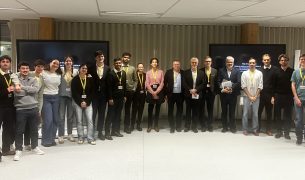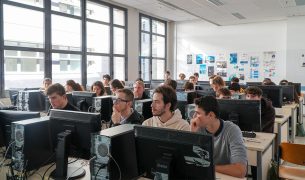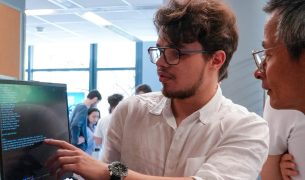
The ESILV Hackathon – PLM (Product Lifecycle Management) & DPM (Data Protection Management) Challenge 2025 brought together more than 500 participants from the class of 2026 to address industrial challenges related to product lifecycle and data protection. The event brought together Capgemini, Renault Group, Dassault Systèmes and Actadata for three days of immersion, followed by […]

After completing her undergraduate studies in Industrial Engineering in Peru, Gabriela Veliz chose France to pursue graduate studies in a country known for its long-standing engineering tradition and its strong industrial ecosystem. From this starting point, she details the reasons that led her to pursue the Master in Engineering at ESILV. Building a Technical Foundation […]

Preparing for your studies in France, and succeeding after, involves having a solid understanding of how your degree is defined. The decision to study abroad implies immersion in a new academic environment, with increased chances of contrasting with one’s past educational experiences in multiple ways. There is, most probably, a different language of instruction, a […]

The world of Finance has evolved at an increasingly rapid speed over the last years, bringing a series of new challenges to navigate. Markets move faster than ever, and they’re driven by algorithms, data, and global interconnections that require precise expertise. This is where Financial Engineering comes in, enabling the blending of finance, math, programming, […]

To strengthen access to advanced education in engineering, ESILV is offering scholarships for international candidates admitted to the MSc in Aeronautical & Aerospatial Engineering and the MSc in Financial Engineering. Motivated international students seeking to advance their skills in two key areas of engineering can benefit from a multidisciplinary learning environment at ESILV. Why study […]

ESILV and Strate School of Design announce the launch of the dual degree programme Responsible Industrial Design and Engineering (RIDE), aimed at training professionals capable of addressing the complex challenges of technological, ecological, and industrial transformations. The Responsible Industrial Design and Engineering (RIDE) programme meets the needs of a new generation of versatile professionals, able […]

Paris is more than a cultural and political capital—it’s a strategic hub for aerospace engineering. With significant industry players and specialized clusters, the Île-de-France region offers a strong foundation for students aiming for careers in aeronautics and aerospace. Choosing where to study can shape a career. In aerospace engineering, Paris stands out for its industry […]

De Vinci Higher Education will introduce a tuition fee waiver in October 2025 to support international candidates enrolling in the MSc programmes at ESILV. The scholarship initiative reflects a broader commitment to enhancing global representation in engineering education. A Financial Incentive to Promote International Access De Vinci Higher Education is offering a 30% tuition fee […]

For many, the word “engineering” springs to mind images of extravagant skyscrapers, fancy technology, or complex math problems. But engineering is way more broad and even peculiar at times. Some engineers design record-breaking roller coasters, while others work on shaping the perfect texture of chocolate Some jobs don’t just seem like careers; they seem like […]

The MSc in Aeronautical & Aerospatial Engineering, the MSc in Financial Engineering, and the MSc in Fintech & Digital Banking at ESILV have officially received the MSc—Master of Science accreditation from the Conférence des Grandes écoles, marking a significant milestone in the school’s academic recognition. This recent accreditation underlines ESILV’s commitment to delivering internationally recognised, […]

Not long ago, people thought “finance” meant grey suits, long hours, and spreadsheets. Now? It means flexible jobs, exciting tech, and digital platforms reshaping how we use money, and that’s all thanks to FinTech. It’s a space where engineers, coders, and creative thinkers build tools that power everything from banking apps to AI-driven investments. No […]

Movies have long been the kings of storytelling, drawing audiences into captivating narratives through stunning visuals, compelling scripts, and unforgettable performances. But video games have recently emerged as serious contenders, blending cinematic techniques with interactive storytelling to create immersive experiences that rival Hollywood blockbusters. Are we surprised, though? So, what’s making this shift possible?
